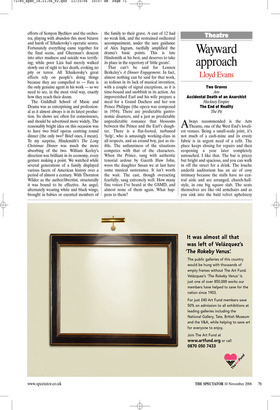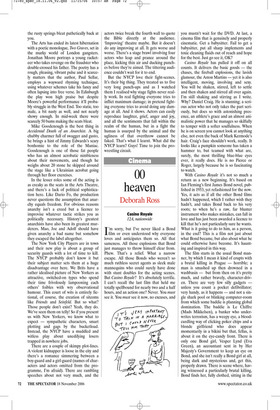Wayward approach
Lloyd Evans
Two Graves Arts Accidental Death of an Anarchist Hackney Empire The End of Reality The Pit Always recommended is the Arts Theatre, one of the West End’s loveliest venues. Being a small-scale joint, it’s not much of a cash-mine and its crusty fabric is in urgent need of a refit. The place keeps closing for repairs and then reopening a year later completely untouched. I like that. The bar is pricey but bright and spacious, and you can walk in off the street for a drink. The louche underlit auditorium has an air of cosy intimacy because the stalls have no central aisle and are arranged, church-hallstyle, in one big square slab. The seats themselves are like old armchairs and as you sink into the bald velvet upholstery the rusty springs bleat pathetically back at you.
The Arts has ended its latest hibernation with a poetic monologue, Two Graves, set in the murky world of London gangsters. Jonathan Moore portrays a young racketeer who takes revenge on the fraudster who double-crossed his father. The poetry has a rough, pleasing, vibrant pulse and it scarcely matters that the author, Paul Sellar, employs a wayward rhyming technique, using whatever schemes take his fancy and often lapsing into free verse. In Edinburgh the play won high praise but despite Moore’s powerful performance it’ll probably struggle in the West End. Too static, too male, a bit nasty as well, and not nearly showy enough. In mid-week there were scarcely 50 bums making the seats bleat.
Mike Goodenough is the best thing in Accidental Death of an Anarchist. A big chubby charmer full of swagger and gusto, he brings a hint of Jimmy Edwards’s scary bonhomie to the role of the Maniac. Goodenough is one of those fat people who has an almost acrobatic nimbleness about their movements, and though he weighs about 20 stone he skipped around the stage like a Ukrainian acrobat going through her floor exercises.
In the lesser roles some of the acting is as creaky as the seats in the Arts Theatre, and there’s a lack of political sophistication here. Like Dario Fo, the production never questions the assumption that anarchy equals freedom. For obvious reasons anarchy isn’t a creed but a licence to improvise whatever tactic strikes you as politically necessary. History’s greatest anarchists have also been its greatest murderers. Mao, Joe and Adolf should have given anarchy a bad name but somehow they escaped the label altogether.
The New York City Players are in town and their new play is about a group of security guards with a lot of time to kill. The NYCP probably don’t know it but their subject matter sets them at a huge disadvantage over here. We Brits have a rather idealised picture of New Yorkers as attractive, switched-on types who spend their time frivolously lampooning each others’ foibles with wry observational humour. This court of wits is entirely fictional, of course, the creation of sitcoms like Friends and Seinfeld. But so what? Those people don’t exist? Yeah, they do. We’ve seen them on telly! So if you present us with New Yorkers, we know what to expect — sympathetic characters, smart plotting and gags by the bucketload. Instead, the NYCP have a muddled and witless play about unedifying losers trapped in nowhere jobs.
There are a couple of skimpy plot-lines. A violent kidnapper is loose in the city and there’s a romance simmering between a boy-guard and a girl-guard (names of characters and actors omitted from the programme, I’m afraid). There are rambling speeches about not very much, and the actors twice break the fourth wall to quote the Bible directly at the audience. ‘Improving’ theatre maybe. But it doesn’t do any improving at all. It gets worse and worse. There’s a stage brawl involving four actors who leap and prance around the place, kicking thin air and ducking punches before they’re aimed. The tittering audience couldn’t wait for it to end.
But the NYCP love their fight-scenes. It’s their big thing. They treated us to five very long punch-ups and as I watched them I realised why stage fights never really work. In real fighting everyone tries to inflict maximum damage; in pretend fighting everyone tries to avoid doing any damage at all. And it shows. Actors can easily reproduce laughter, grief, anger and joy, and all the sentiments that fall within the realm of the human, but in a fight the human is usurped by the animal and the ugliness of that overthrow cannot be faked. That’s what I learnt. What did the NYCP learn? Guys! Time to join the prowrestling circuit.



































































































 Previous page
Previous page